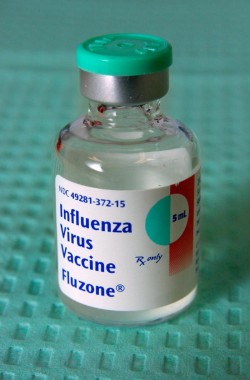*Editor’s Note: Elephant Journal articles represent the personal opinion, view or experience of the authors, and can not reflect Elephant Journal as a whole. Disagree with an Op-Ed or opinion? We’re happy to share your experience here.
It’s that time of year! Fall bring beautifully colored foliage, the holiday fun of Trick or Treat, and Flu Shots in preparation for the inevitable coming of flu season.
I’m offering influenza vaccines, a.k.a “flu shots,” on a daily basis. The vaccination guidelines, high risk populations, and contraindications are fresh in my mind.
As a Family Nurse Practitioner, I’m always interested in patients’ questions and fascinated by their passionate attitudes for or against vaccination. I’m admittedly brief and efficient when a patient is already asking for the shot or quickly says yes to my offer.
I’m thorough when a patient is full of questions or concerns. But I cringe and throw on the brakes when a patient says “I will never get a flu shot!” I hope people don’t actually notice that I inwardly cringe and throw on the brakes. But here’s a little secret—I do.
Hearing never is a big red flag to me that the consumer is uninformed or misinformed, or perhaps simply closed-minded. As I will discuss, the flu vaccine is a vaccination decision that should be made on an annual basis.
It is your undeniable right to decline a flu shot—or for that matter, any suggested medication or treatment for any disease. But before you are tempted to say never to vaccination, let’s chat about some facts and philosophical analogies.
I know I am taking a risk of backlash and disagreement just by putting my thoughts to paper, but I feel strongly about the issues of informed decision making as a medical professional. And, I feel strongly about examining the public health aspects of vaccination recommendations as a mother of young children.
I hope you will bear with me, and that by putting myself out there, I can reach an open-minded audience. Modern medicine is not perfect, but it is not always the enemy. Let’s make our vaccination choices in a mindful fashion that ensures we are open-minded and informed consumers who analyze both our personal health risks and the role our decisions play in affecting the the health of others.
The Centers For Disease Control (CDC) offers reputable up-to-date information on influenza season and influenza vaccination via their website. Individual questions or concerns regarding the decision to vaccinate should also be discussed with your medical provider.
Unless there are contraindications, it is recommended that people over the age of six months be vaccinated against influenza each year. Vaccination is increasingly easy to access at flu shot clinics, in local pharmacies, and of course through your primary care provider’s office. These clinics use standard screening questionnaires and trained professionals to administer the vaccines.
Over the years, continued studies have looked at the risk-benefit ratio of vaccinations. Multiple studies have discredited the autism-vaccine link. Though the preservative Thimerosal is considered safe in small doses, manufacturers have willingly responded to public concerns by reformulating and repackaging many vaccines without preservatives.
The injectable forms of standard flu vaccines do not contain live virus, and therefore can not give you the flu.
Influenza is a viral illness that is spread by airborne droplet contamination. First line defenses against the spread of influenza are the common sense standards of covering coughs and sneezes, staying home from work or school if you have a fever, and the gold standard of good hand-washing.
Even if you are exposed, having a healthy immune system that is prepared to respond naturally can prevent or limit the severity of illness. This is yet another reason to live a healthy lifestyle year round! Vaccination does not replace these first line defenses, but it is a widely available option as an adjunct to your health routine every year.
Viruses are naturally occurring organisms that remind us of the power of the natural world. They survive; they spread; and they mutate. Certainly the recent headlines concerning Enterovirus D68 outbreaks and the international Ebola outbreaks remind us of this power. Influenza, specifically, requires annual vaccination because various strains surface from year-to-year. Each year, influenza is tracked internationally and vaccines are formulated for specific coverage of the most likely strains for the immediate flu season.

One way to think about the need to protect yourself from viral illness is to use the analogy of a major natural storm threat.
Would you decide to never evacuate in a tornado or hurricane warning, or would you gather the latest information and analyze your specific circumstances at the time of the storm? I see viral illnesses, with potential epidemics and pandemics, as natural storm threats to our safety.
The power of influenza may be underestimated because some form of influenza comes annually. Many of us have had the flu at least once or know someone who has. It might have been miserable, but there are plenty of people walking around who have survived this common illness. Some will argue against vaccination because they got the flu even though they got their flu shot.
This may be true since no vaccination offers 100 percent immunity, though it is likely they had less severe symptoms because of the vaccination. Also, “flu” is a loosely used term for a variety of illness, including the “stomach flu” or any variety of viruses that cause a fever. The flu vaccination is not all encompassing and only offers immunity to specific strains of true influenza.
But let’s not forget that influenza does cause severe illness, hospitalizations, and death. The CDC tracks flu-related hospitalizations and deaths and reports these statistics on its website:
- In a the 30 year reporting period from 1976-2006, the number of U.S. flu-related deaths per year ranged from 3,000 to 49,000.
- An average of 20,000 children under 5 years of age in the U.S. are hospitalized each year from flu-related complications.
- In the 2013-2014 flu season, there were 96 lab-confirmed influenza-related deaths of children in the U.S.
Your personal risk is not only based on your personal health, but also on a variety of ever-changing factors such as prevalence of disease, severity of disease, and your risk of exposure. If you don’t wish to automatically vaccinate each year, then here are some points to consider on an annual basis.
Here are 8 ‘Never Say Never’ reasons to consider your individual risk level:
1. Am I pregnant?
2. Do I have a new or worsening chronic medical condition that increases my risk?
3. Do I have a weakened immune system due to chronic illness or as a side effect of a medication?
4. Have I had a recent accident, injury, illness, or surgery that means my immune system is already hard at work and may be weakened during the coming flu season?
5. Am I planning an upcoming surgical procedure that might increase my risk of exposure because I will be hospitalized during flu season?
6. I am a year older since last fall. Have I reached an age that places me in a higher risk category?
7. Has my exposure to the public changed due to work, volunteerism, or travel?
8. Is there something different about this year’s flu trend that should concern me? Are there more cases? Are the more serious complications that usual? Is there a strain of flu that is targeting healthy, young adults who are not typically seen as high risk?
Vaccination recommendations are two-fold recommendations based on a) personal health recommendations and b) public health recommendations. Let’s not forget that we are all in this together!
Historically, national and worldwide vaccination programs have been successful in eradicating some viral diseases, and are good examples of the importance of vaccination programs. The CDC reports that smallpox was eradicated by a successful worldwide vaccination program. The last U.S. case of smallpox was in 1949, and the last naturally occurring case of smallpox was in Somalia in 1977.
According to the CDC, measles was documented as eliminated from the U.S. in 2000. However with international travel, measles has returned to the U.S. via imported cases. These initial cases have then cause pocket infections that are most likely to arise in areas where U.S. residents have opted out of standared vaccination guidelines. 2014 is seeing a record outbreak of measles with 594 confirmed cases as of the date of this writing.
Poilo is a highly contagious viral illness that attacks the nervous system. According to the World Health Organization (WHO), the incidence of polio has decreased by 99 percent since 1988 as a results of global efforts to eradicate disease through vaccination. In 2014, only 3 countries remain polio-endemic.
While we may not be able to eradicate influenza, there are benefits to “herd immunity” that decrease the potential scale of infection and illness each year. Not everyone who desires a flu vaccine is eligible. For example, children less than six months or individuals with egg allergies can not be vaccinated. Vaccination does not ensure 100 percent conversion rate to immunity, so even with vaccination, an individual’s exposure risk still plays a role in their overall risk.
In an effort to examine the role our personal choices play in public health, let’s look at a couple of non-vaccine related analogies.
How many of us have made personal efforts to decrease our carbon footprint, only to become frustrated as we look around to see others negatively impacting our shared environment by leaving increasingly larger footprints that we can not control? Most of us don’t disagree with an individual’s right to drink alcohol, but most of us advocate against driving under the influence because it risks public safety.
Similarly, remember that your individual vaccine choices do have the potential to impact others. Consider these questions as you make your choices each year.
7 Never Say Never Reasons to consider getting vaccinated for the benefit of others:
1. Will I be in close contact with a child under 6 months of age who can not have a flu shot?
2. Will I be in close contact with children under 5 who are among the highest risk group?
3. Will I be in close contact with elderly?
4. Do I work closely with any high risk population? For example, in a day care, a school, or a health care setting.
5. Do I have a family member, friend, or coworker who is ill or immunsuppressed this year? A common example would be a friend who is undergoing treatment for cancer.
6. Is there something different or more dangerous about the flu this year that makes it a larger public health risk?
7. Is there something different about this flu season that is not related to the flu itself, but that increases the importance of flu vaccination? For example, Enterovirus D68 has nothing to do with influenza and getting a flu shot will not protect against D68. However, con-current infection with D68 and influenza would be very dangerous to a child.
Ultimately, flu vaccination is recommended, but is an individual choice. It should not be considered a replacement to good health practices. It should not be considered a replacement for basic infection control practices: covering coughs and sneezes, staying home from work when you have a fever, or the ultimate infection control process of hand-washing. But it is an available adjunct in an emphasis on health promotion via disease prevention.
Flu vaccination also plays a two-fold role in protecting the health of both the individual and the general public. I implore you to consider flu vaccination on an annual basis, making mindful decisions that are informed, open-minded, and considerate of our fellow mankind. Never say Never! to a flu shot again.
~ Jennifer Pinard
Love elephant and want to go steady?
Sign up for our (curated) daily and weekly newsletters!
Editor: Renée Picard
Photos: Illuminating 9_11 at Flickr; Wiki Commons



Read 1 comment and reply